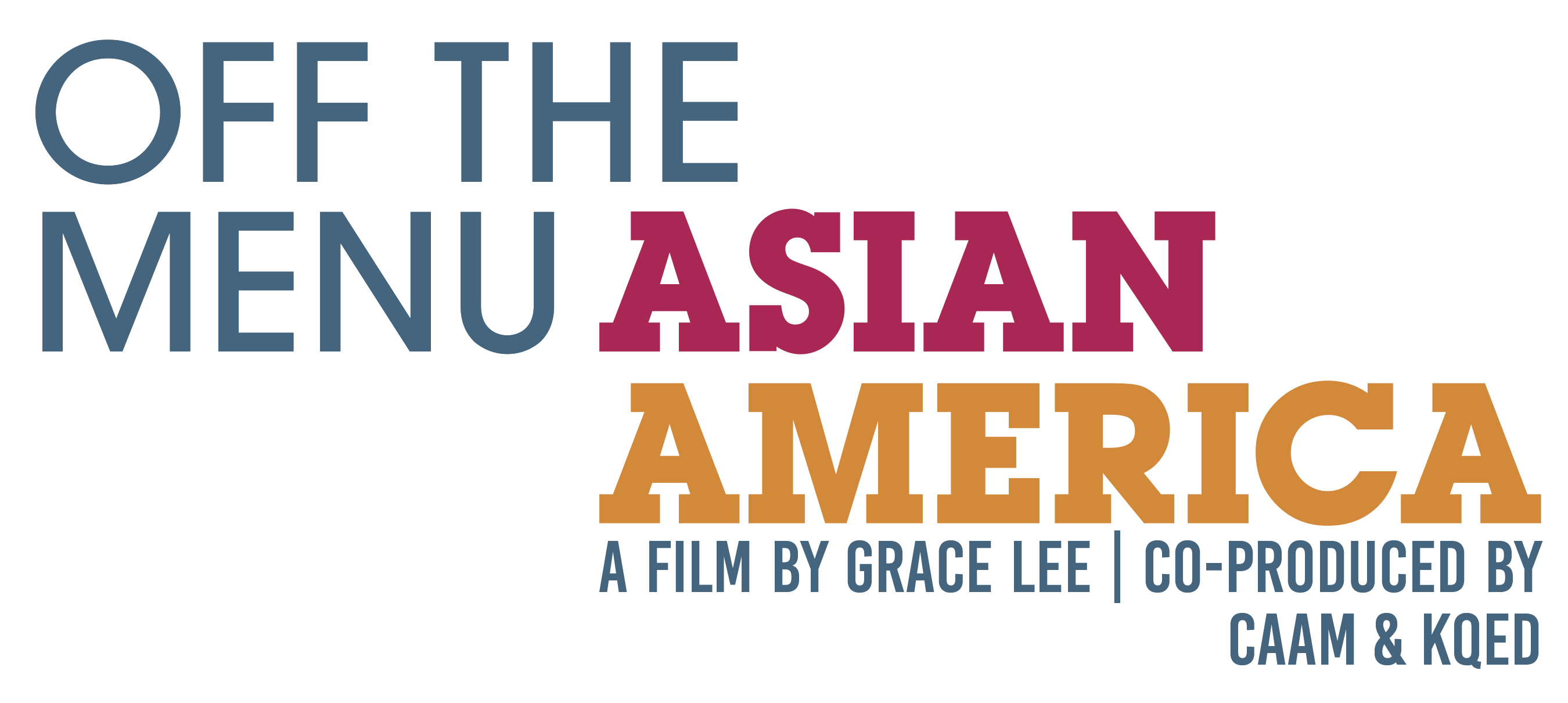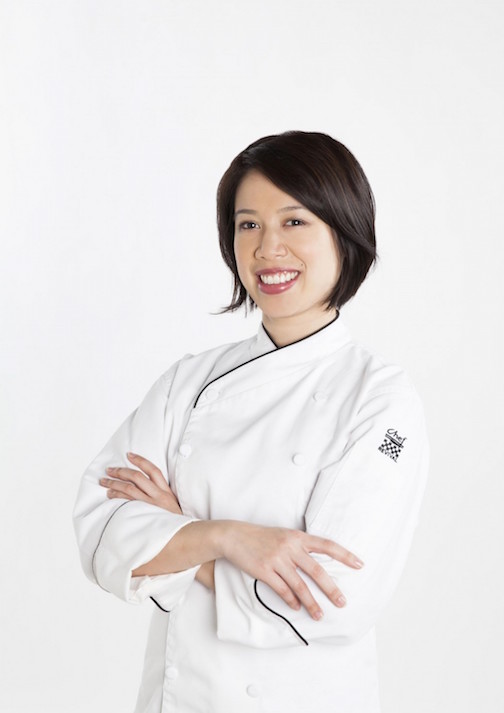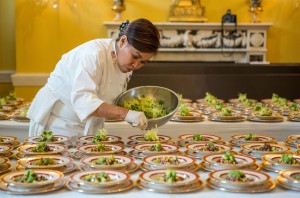She’s best known for warming Gordon Ramsey’s stone-cold heart with her soulful Vietnamese-inspired dishes and beating out hundreds of other contestants to win the competitive cooking show, MasterChef. While that itself is a feat, Christine Ha has another odd stacked against her: she is legally blind. After an autoimmune disease slowly took her vision over seven years, rendering her in need of a cane and an assistant in the kitchen, Ha found solace in the creativity of food and writing. As a self-taught cook, the recreation of recipes purely from memory also helped cope with the passing of her mother, whom she lost as a teenager. Despite all of this, you’ll never hear Ha feel sorry for her situation. Instead, she hustles to promote her cookbook, make television appearances around the world and embrace her unique identity in the culinary scene—she dubs herself “The Blind Cook.”
—Diana Emiko Tsuchida
Describe your childhood—is there anything that set the tone for a life in food?
I grew up in Texas and I’ve lived in Houston. I would say that I did grow up in a family that really did make good food. My grandmother, my aunts, my mom really were good cooks and I really took that for granted and as a child you’re in this ego-centric world where you think what you live is what everyone else’s life is like. So I thought it was very common that people were growing up eating good home cooked meals and it wasn’t until my mom passed away when I was a teenager (and I started eating at friend’s houses and saw that not everyone ate the way I did) that I realized that I was fortunate to have grown up in a family and household like that. I would say that my interest in food didn’t start until I went away to college and I had to learn to cook as a means of survival and my mom passed away leaving me no recipes and so I was left with this nostalgia for her food and not knowing how to recreate it. I had gone to a secondhand cookbook store and bought a cookbook of Asian food, bought my first set of pots and pans and knives that were very inexpensive, and I had a small kitchen where I could actually start learning to cook. So I would just read the recipes word for word and start executing them to that detail and just learned from there. And I think I was fascinated by the process of taking raw ingredients and doing things to them–you know applying certain techniques and heating elements and having it turn into a complete, cohesive dish that you could eat. So for me it was the fascination of art and science both mixed together and it’s hard to cook for just one so I always cooked for roommates and friends so once in a while when I would cook something good or edible I think I found a lot of joy in being able to feed other people and being able to see other people could enjoy my creations that was really I think fulfilling for me so I think that’s where my love of cooking began.
You said you were nostalgic for your mom’s cooking. Is there a specific dish that always reminds you of her?
Some of my favorite dishes that she made–I can think of three that really stood out. So one is beef noodle soup or pho, which is really common nowadays in the U.S. But that was something she made really really well and I remember a lot of her friends kept urging her to open a restaurant because she had a really good recipe and that recipe I think my father told me she had written down the ingredients but the recipe was lost so I don’t know what happened to it and I have not yet been able to recreate her beef noodle soup and she also makes a chicken version which is really good too and that I’ve been able to have a little more success at and that recipe is in my cookbook. Another dish that really stands out are her egg rolls. And egg rolls are a childhood favorite because they’re easy to eat they’re delicious, you know, who doesn’t love fried food, it makes everything taste better. And they’re finger-foods so it was something my mom would do for special occasions like for my birthday party or certain school events or certain school events where it was like international day so everyone had to cook an ethnic cuisine, she would make that for my classmates. So that was something she made really well too and that was probably the first dish I was able to recreate of hers by memory just by using all of my senses like remembering how the fillings felt before they were cooked, how it smells, how it tasted after it was fried. That was probably the first dish of hers I was able to reverse engineer by memory and so that’s a really solid recipe. And the third dish is probably the braised pork belly, it’s the very common household meal, kind of like poor man’s food and I grew up probably eating that twice a month at least. And at the time I was like, it’s good but it wasn’t something I didn’t really really cherish until I didn’t have it anymore from my mom’s kitchen and it’s funny because that’s probably sort of the epitome of home-cooked Vietnamese food. And I did that dish for the auditions for MasterChef, not the one that aired on TV, but the one that was for the 30,000 cooks across the U.S, I did that dish for that very first audition and I cooked the same dish that kind of elevated the recipe for the finale, on TV so that was kind of something that came full circle and was a tribute to my mom, so those three dishes were the cornerstones of her cooking that translates to mine.
It’s funny how you call pork belly “poor man’s food” but now you see it in very upscale, trendy restaurants. Do you feel there’s something that gets appropriated with traditional ethnic cuisine?
It’s so interesting how the economics of food and just the restaurant industry and the cuisines have changed over the years and it’s just really fascinating how things are cyclical. Yeah for sure it’s interesting how pork belly and all these things I used to eat because it used to be so cheap growing up and now it’s like getting more and more expensive and now it’s in the top restaurants. I have to preface this by saying I’m a very open-minded person so I think for me, personally, I’m sort of a traditionalist when it comes to food. Like I think there’s a reason why certain flavors go with each other why there’s certain dishes that have been in certain cuisines that have been there for decades if not centuries and for me, I think it’s partly because I’m not a professional chef, I didn’t have any formal culinary training despite what others may think, me having won a television show, written a cookbook, I still feel like I only know 5% of the culinary knowledge that there is to know out in this world. And so I’m still trying to learn traditional dishes. And something I learned on MasterChef is that you have to know the basics before you can break the rules and it’s like that with anything, it’s like that with writing, too. You have to learn the rules before you can break the rules. So I’m still trying to learn traditional techniques but with that being said I applaud chefs and restaurants that are doing new things because I think that’s what’s so great about food. There’s so many translations of it, there’s so many interpretations of it and it’s subjective in a lot of ways. I can eat anything from things that are like Michelin-rated restaurants or I can eat a dollar taco off the street and I think both offer different experiences, that’s what’s so great the world of food is so wide, there’s an audience for everything. And it just really depends, as a chef, on what in particular speaks to you. I think there’s so many cooks out there and people doing different things feeding off each other’s creativity and I think that’s what makes the culinary scene evolve and I think that’s really fantastic. So I think whatever people do with pork belly or however they interpret it, it’s their art and I have no problems with it.
Why did you audition for MasterChef?
I decided to try out mainly because my husband pushed me. He is a fan of Gordon Ramsey and he was just like, if anything you just have to go on this show and have Gordon call you a donkey and then just go home and have that experience under your belt. And also as a writer, too, you try to experience a lot of things in life because it feeds your creativity and your writing so I thought I would go have this experience and then come home and have some kind of enriched material to write about. But then it came also down to the fact that it’s kind of interesting thing to try out for, it’s for home cooks, which I am, and I really love food so something that really pushed me too is the fact that I had been dealing with a lot of health issues and all sorts of obstacles in my life and I think what these challenges have made me realize about myself is that I can persevere and I thought even if I fail, why not try. I just noticed in myself that ever since I lost my vision I’ve become a lot more daring and courageous to take on a lot of things despite the idea of failure. I think I’m much more fearless now that I have no vision so I thought why not just try out for it?
Did you ever get the sense you were going win?
I don’t think so. I think along the same lines of having a pretty challenging life, dealing with my mom passing away in adolescence and going through vision loss and my autoimmune condition I kind of tend to have this philosophy where it’s kind of like a self-defense mechanism where I expect the worse but hope for the best. But I really try not to focus on that hope and I expect the worse. So it’s kind of just like going in there and shrugging my shoulders and not taking it was seriously as everyone else. I always felt like the other contestants were always trying to dissect every little thing on the set and how the cameras moved and how every little thing was set up. And I think part of the advantage for me was not being able to see all of this so for me I was just kind of in my own head and sometimes that’s worse but for me I was like, “well I’m not going to take this seriously I’m here to learn what I learn, experience what I can experience and the day I go home was meant to be and whatever, I tried.” And that was my mentality. So I went in there everyday just trying to focus on being the better version of myself than i was the day before, whether it was as a person or as a chef. I just think that I was trying to be better than myself rather than the contestants. I think that really did help me focus on my own work but I never really thought that I would win.
It’s not to say that I didn’t want to win and it’s not to say that I’m not competitive because I’m an extremely, extremely competitive person. If I wasn’t I think I would’ve thrown the towel in a long time ago because it’s hard work to be on that show. There’s a lot of things off-camera we have to deal with and it’s hard to go through these challenges everyday and it’s very stressful so had I not been a competitive person I would’ve just given up early on but because I’m competitive I knew I was going to go down fighting, for sure. If I went home, I don’t care, as long as I tried my best. I think it’s a mixture of these attributes to make it through to the end.
What is your advice to a young woman who’s had setbacks or is facing obstacles?
I think some of the advice I’d give to someone in that position would be really trust yourself. It takes a level of maturity and a level of experience to really have intuition and know how to trust your gut instinct because you don’t really build that until you start building confidence and it’s really something that I’ve reflected on from being on the show. Because if you follow my journey on the show at the beginning I wasn’t really confident I didn’t know how I measured up to other people and then as I learned more and more I was getting more confidence and there were setbacks where I would cook something where I would try and please the judges and then I’d really screw it up and I thought to myself after that, “Well I’m just going to do what I believe in and if I can stand behind my dish then I know it was the right dish to make.” I think that’s good advice for someone trying to achieve things they think are unattainable is to experience a lot of things, don’t be afraid to make mistakes and I think from those experience it builds character and starts teaching you to trust yourself and gives you intuition. As long as you believe in what you create and stand behind it, and you have logic as to why you think this is a good dish, or whatever it is you created, if you believe in truly 100%, who is anyone else to say that you’re wrong? There are so many different opinions in this world it’s hard to discern between what is helpful and so you have to be happy with what you’re creating and to have integrity.
Do you think there is a lack of representation of women in the culinary world?
I do think that. I think times are definitely progressing and I think it’s slowly getting better I don’t think it’s completely there yet where women are treated equally, not only in the kitchen but anywhere in the workforce and I know this just because I have friends who are professional chefs and they encounter a lot of executive chefs who are male who will tell them directly, “You don’t belong in this kitchen because you’re a woman because all you do is cry.” It’s sort of sad that that’s the world right now but these woman friends of mine have a lot of perseverance too and they just don’t care and they say, well I’m going to deal with this and even if it’s not fair, life is never fair. So you just have to take things in stride and you have to learn to deal with it or walk away from. I do think women are breaking through a lot in that industry and I’m still there’s still a long road ahead, but as most things in the world, it’ll happen eventually.
Do you have plans to open a restaurant?
I get asked this question a lot so my answer to is always “To take over the world, I’m going to do everything.” I would love to open a restaurant, it’s been a little bit difficult because I understand my own limitations, I didn’t go to culinary school so it’s different to be running a commercial kitchen versus cooking three courses for eight people in your house. You have to learn how to scale food, you have to learn how to run a professional kitchen, staff people, do inventory. So I know I don’t have that experience. And I also know my limitation as a visually impaired cook. And not only that but these past two years I’ve been swamped so swamped with a new Canadian cooking show I have and doing tours for cooking demos and helping out with a lot of benefits so right now it’s hard to think about really being hands on in opening a restaurant because I’m such a perfectionist that I have to be there in my hometown or wherever it is so that I make sure everything is exactly how I want it to be. Right now that’s a little bit on hold while I’m pursuing these other things but it’s not to say I haven’t been in discussions with people about opening a restaurant so I definitely think that’s in the future. I’m pretty sure that will happen eventually.
And are you still writing?
I think cooking and writing are definitely two of the things I love most and for the past two years writing has taken the back burner in my life. Although I did manage to graduate in the midst of all this craziness. I wrote the cookbook which I really enjoyed, I’m still working on my memoir which is plodding along. They say that for any kind of creativity you can’t always be doing the same thing so for chefs they say you really need to get out of the kitchen and find another hobby. Writers, you need to get away from your desk and cook up some stuff or go outdoors, travel, whatever. Because these different things really make up the different nuances of what your whole creative outlook will be so I think it’s important to balance all these things in your life. You need to have a personal life, a social life, you have to workout and try and stay fit and try to enjoy life. So for sure I’m still writing but right now that’s really challenging.
What do you want to be remembered for?
If I were to think about what I’d want as my epitaph on my gravestone, I would want to be known as a person that was kind of like a mover and shaker. Someone that was able to help other people whether it was through her writing or cooking but at the end of the day that I did it with humility and that I was able to help other people through whatever it is they’re going through.
+ + +
 This story is a part of Off the Menu: Asian America, a multimedia project between the Center for Asian American Media and KQED, featuring a one-hour PBS primetime special by award-winning filmmaker Grace Lee (American Revolutionary: The Evolution of Grace Lee Boggs), original stories and web content.
This story is a part of Off the Menu: Asian America, a multimedia project between the Center for Asian American Media and KQED, featuring a one-hour PBS primetime special by award-winning filmmaker Grace Lee (American Revolutionary: The Evolution of Grace Lee Boggs), original stories and web content.


